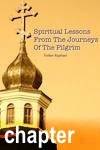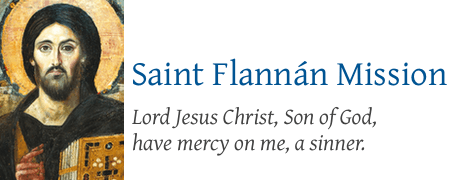 When we look to God, are we going to Him out of fear, or out of greed? Or do we approach Him with just a simple love?
When we look to God, are we going to Him out of fear, or out of greed? Or do we approach Him with just a simple love?
Dear beloved,
The pilgrim settled in the forest with the forester, as caretakers for the forest. The forester recounted his story to the pilgrim. He was a successful businessman who sinned a great deal. Eventually, he met an old deacon who read him the Book of Revelation. After learning about the suffering of the sinners at Christ’s return, the man gave up his business and took up the job as a forester, in exchange for simple bread, clothes, and candles for prayers.
The forester spent the next ten years in the forest, following a strict prayer rule every day, with the life of a monastic. For ten years, the forester found great peace and joy (Romans 5).
But the forester explained to the pilgrim that lately, he began to experience a loss of faith, questioning the truth in the Word of God, and even wondered if he should pack up and return to being a businessman instead.
One of the worst thoughts the evil one can do to us is to instill a sense of hopelessness and doubt. With doubt comes loss of faith, and eventually, a sad apathy that denounces the existence of God and His Word. The pilgrim considered that the devil does not segregate between the rich or the poor; but will attack anyone with even a shred of faith in God, and he will attack more ferociously if a person has steadfast faith in God, seeking to destroy such a man completely. Know this, the devil is void of love, and knows only hatred, for he was cast out of Heaven and is stricken with an eternal hatred for the loved creation of God – mankind.
The pilgrim was sympathetic to the forester, and read Saint Hesychios’ admonitions in the Philokalia to him. Accordingly, the pilgrim explained that some people might abstain from sin out of the fear of eternal suffering, while some others might desire the fruit of Heaven out of greed. Both kinds of people would not find God, and would fall prey to the fruits of the evil one, because they try to find God with the heart of slaves, or hearts of mercenaries. God desires that we return to Him as sons, out of pure love and simple devotion. The pilgrim shared with the forester, the power of the name of Christ, through the prayer of the heart (Philippians 4:13).
In many of our own spiritual journeys, we might seek esoteric materials, and may get sidetracked on our singular and narrow journey seeking God and His face. While all these time, God only wanted us to return to Him, and to shine the light of true love back to Him, just as He has been so lovingly shining His light of love, grace and mercy, continuously on us. We may be blind to His light for so long, but He was there, still is there, and will always be there.
The pilgrim gave spiritual rest to the forester, and then quickly retreated to his own cave, and started reading his Philokalia again. He was eager and determined, and read the book from the beginning to the end (1 Corinthians 12:31 and 1 Thessalonians 5:19). He started praying continuously to petition the Lord to grant him the mercy of knowing what the holy fathers wrote in the Philokalia, and eventually, he fell asleep. In his dream, his departed starets explained to him, that the Philokalia (like the Holy Bible) is a holy mystery, and would present simple wisdom to the simple, and deep wisdom to the wise.
The starets explained that the pilgrim, being a simple man, would benefit much more by NOT reading the Philokalia from the beginning to the end, but rather, in the order of (1) Saint Nicephorus the hermit, (2) Saint Gregory of Sinai, without the short chapters, (3) Saint Symeon the New Theologian, (4) Saint Callistus, (5) Saint Ignatius, and lastly, (6) summary on methods of prayer by Saint Callistus, which in this pattern, according to the departed starets, contained the necessary to understand the inner prayer of the heart for anybody. We will briefly discuss readings of Saint Nicephorus the hermit, Saint Gregory of Sinai, and Saint Symeon the New Theologian.
The pilgrim woke up at dawn, wondering if the departed starets did indeed appear to him or it might have been just a delusional thought in his own mind. He looked at his Philokalia which was on a rock table, and miraculously, the Philokalia was flipped to the exact page where the Starets mentioned, on methods of prayer by Saint Callistus, with charcoal markings as well! The pilgrim had lovingly wrapped his Philokalia and kept under his bed the previous night.
The pilgrim gave us a wise warning, that when one is eager and earnest about inner prayer, we must discern and pray unto God, so that we do not fall prey to delusions (1 John 4:1, St Matthew 24:24). When we pray, are we are simply praying and exalting God? Inner prayer is about reaching out to God, without ego, pride, greed, or malice. The closer we approach God with a pristine mind without the shackles of the primary sins, especially that of pride and greed, the more we can discern if we are indeed closer to God, or closer to the evil one. How so?
Imagine approaching inner prayer with an intention of wanting to be “better” than someone else. The evil one will sense your pride and greed, and present you with signs and wonders, deluding you that you have attained the inner prayer, when in fact you are nowhere near it. Praying must have a clear and honest intention, that of simply loving God and recognizing how far we are removed from His presence. The praying heart should not have any other motive of want – it should not have any beastly lust after prideful gains. This is an important consideration when approaching inner prayer. The devil will often trick us with what we want to see through our own passions, while God will only show us what IS – the Truth. We will read through the book more on this next.
I often find the greatest consolation when praying, to simply forget the daily worries for a while, and focus only on God. I simply pray the Jesus prayer, dropping my emotional burdens, my work challenges, my pretensions, my pride, my worries, my passions, and simply pray silently in my heart – the Jesus prayer. I do not ask God of anything, and when distractions arise, I return to the Jesus prayer. Even if I must engage in conversation at work, my heart is never far from the Jesus prayer. There is a simple beauty of the Jesus prayer, which also infers the truth of the love of God – He does not leave any of us behind, even as He knows how far we have fallen behind. Let us pray:
“Lord Jesus Christ, Son of God, have mercy on me, a sinner.”
